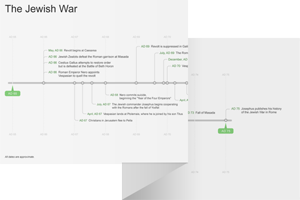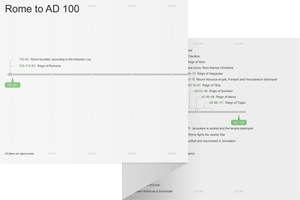8:1–5 After the interlude of ch. 7, the seventh seal is opened and seven angels receive seven trumpets that signal a further round of judgments when blown (vv. 1–2). But first, another angel takes a censer, symbolizing the prayers of God’s people, and hurls it to the earth (vv. 3–5). |
8:1 he opened the seventh seal The Lamb resumes His activity from ch. 6.
there was silence in heaven In the ot, silence is indicative of God’s impending judgment (see Hab 3:3–6; Zech 2:13–3:2). There is a dramatic pause in the endless praises of the living creatures (Rev 4:8).
8:2 seven angels These may be the seven archangels spoken of in Jewish tradition (see Tobit 12:15; 1 Enoch 20). Of these, only Michael is mentioned by name in Revelation (Rev 12:7).
seven trumpets Instruments of battle (e.g., Josh 6:5). When blown by the angels, these trumpets initiate the next seven judgments.
8:3 another angel Different from the seven angels of Rev 8:2.
 Angels in the Bible Table
Angels in the Bible Table
golden censer A rounded vessel in which incense and burning coals were placed together. The resulting sweet fragrance often accompanied worship ceremonies and religious rituals (see Luke 1:9).
incense Incense is also identified with prayers in Rev 5:8.
the golden altar Perhaps the same altar as 6:9.
8:4 from the hand of the angel The angel appears to be performing a priestly action. This may recall the events of Ezek 10 (compare Lev 16:12; Num 16:46).
8:5 threw it to the earth Initiates judgment in response to the prayers of the saints—probably those recorded in Rev 6:10.
thunders and sounds and lightnings and an earthquake This formula, first mentioned in 4:5, is used again in 11:19 and 16:18. The latter three usages follow a set of judgments (the seals, trumpets, and bowls).
8:6–13 The next wave of judgments begins; four of the seven trumpets are blown in this section. The attacks, which come against nature and the cosmos, are intended to lead sinful humanity to repentance, not totally destroy them. |
8:6 in order to blow them Describes the commencement of judgment. John’s imagery recalls several of the plagues from the book of Exodus.
8:7 hail and fire mixed with blood Corresponds to Exod 9:22–25. John adds blood to the hail and fire of the exodus narrative.
thrown to the earth The same language is used of the fiery coals in Rev 8:5.
a third of the trees In the exodus account, hail shattered the trees of the field.
all the green grass was burned up Probably inclusive of all great vegetation, as in the exodus story which says “all the plants of the field.”
8:8 something like a great mountain burning with fire John may be speaking of a volcano or meteors. Jews viewed the unexpected eruption of Mount Vesuvius (ad 79) as divine punishment on Rome for the events of ad 70—when Titus entered Jerusalem, sacked the city, destroyed the temple, and killed many people. According to Jewish legend, God caused Vesuvius to erupt in recompense, destroying the Roman cities of Pompeii and Herculaneum, which were in Titus’ jurisdiction.
entered Jerusalem, sacked the city, destroyed the temple, and killed many people. According to Jewish legend, God caused Vesuvius to erupt in recompense, destroying the Roman cities of Pompeii and Herculaneum, which were in Titus’ jurisdiction.
a third of the sea became blood Corresponds to Exod 7:20–25. The water may have become blood red due to the fiery mountain.
8:9 a third of the creatures in the sea One-third of the sea life died.
a third of the ships were destroyed Those in the area of the blood sea.
8:10 great star burning like a torch Perhaps a meteor.
rivers and on the springs of water Corresponds to Exod 7:20–25. Whereas the previous judgment was against salt water, this judgment is against fresh water.
8:11 Wormwood A leafy plant that causes water to become bitter. Though wormwood is not poisonous, it can be combined with other elements that are (e.g., Deut 29:18, where “poisonous and bitter fruit” is actually “gall and wormwood”; Lam 3:19). The object from the sky makes the waters bitter.
8:12 a third of the sun The fourth trumpet corresponds to Exod 10:21–23 (compare Joel 3:15; Amos 8:9).
8:13 eagle The majority of manuscripts from all periods have the word aetos (“eagle”) here. However, a minority of late manuscripts have the word angelos (“angel”). The Textus Receptus form of the Greek text follows the latter reading, as do English translations based on it, like the kjv and nkjv.
Woe, woe, woe The threefold use of “woe” corresponds to the three remaining trumpet judgments. It communicates distress, pain, suffering, and displeasure.
to those who live on the earth In Revelation this phrase refers to unbelievers, not all earth’s inhabitants (compare Rev 3:10; 6:10; 11:10; 13:8). Whereas the first four trumpets affected everyone (or at least those in one-third of the earth), the final three are only for unbelievers. The seal mentioned in 7:3 protects the remaining believers from the demonic oppression of the final three trumpets (see 9:4).

|
About Faithlife Study BibleFaithlife Study Bible (FSB) is your guide to the ancient world of the Old and New Testaments, with study notes and articles that draw from a wide range of academic research. FSB helps you learn how to think about interpretation methods and issues so that you can gain a deeper understanding of the text. |
| Copyright |
Copyright 2012 Logos Bible Software. |
| Support Info | fsb |
 Loading…
Loading…


